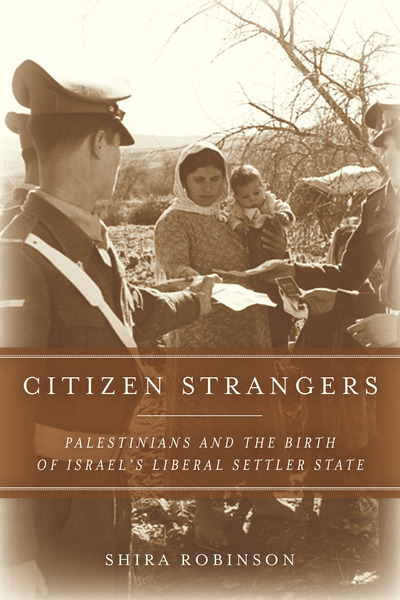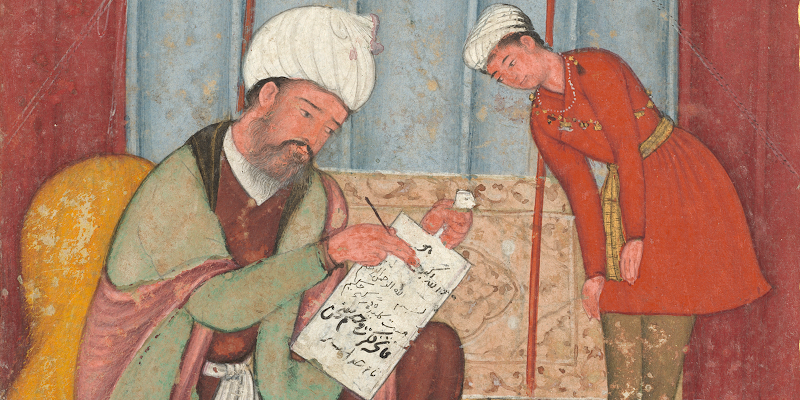Both Citizens and Strangers in Post-1948 Israel
hosted by Graham Auman Pitts
The Palestinian Arabs who remained within the borders of Israel after the 1948 war became citizens of the new state. But in those early years Arab villages lived under military rule that would last nearly two decades. In this episode, Shira Robinson discusses the research for her book Citizen Strangers: Palestinians and the Birth of Israel's Liberal Settler State, which examines the crucial and neglected experience of Palestinians in the early years after the founding of the state of Israel. In our conversation, we explore how the ideal of liberal democracy and the promise of equal citizenship were at odds with the project of the nation-state.
 |
Shira Robinson is the author of Citizen Strangers: Palestinians and the Birth of Israel’s Liberal Settler State. She teaches History and International Affairs at the George Washington University. |
 |
Graham Auman Pitts holds a doctorate in history from Georgetown University's Department of History. His dissertation, "Fallow Fields: Famine and the Making of Lebanon," probes the intersections of ecology, capital, and colonialism in the modern Middle East. He is currently a postdoctoral scholar at North Carolina State University.
|
CREDITS
Episode No. 273
Release Date: 20 October 2016
Recording Location: Baltimore, MD
Editing and production by Chris Gratien
Sound excerpts: Harmandali - Recep Efendi, Cemal Efendi; Baglamamin Dugumu - Necmiye Ararat and Muzaffer; Egil Daglar Ustunden Asam - Viktoriya Hanim; Turnalar Turnalar - Darulelhan Heyeti
Special thanks to Kara Güneş for allowing us to use the composition "Istanbul" in the outro music
Images and bibliography courtesy of Shira Robinson
IMAGES
SELECT BIBLIOGRAPHY
 |
| Citizen Strangers by Shira Robinson Stanford University Press, 2013 |
Beinin, Joel. Was the Red Flag Flying There? Marxist Politics and the Arab-Israeli Conflict in Egypt and Israel, 1948–1965. Berkeley: University of California Press, 1990.
Bishara, Azmi. “Jewishness Versus Democracy,” al-Ahram Weekly, October 28–November 3, 2004.
Bracha, Oren. “Safek miskenim, safek mesukanim: ha-mistanenim, ha-hok, ve-beit ha-mishpat ha-‘elyon, 1948–1954” [Unfortunate or perilous: The infiltrators, the law and the High Court, 1948–1954]. ‘Iyune Mishpat [Tel Aviv University Law Review] 21, no. 333 (April 1998): 333–385.
Cohen, Hillel. Arabs: The Israeli Security Agencies and the Israeli Arabs, 1948–1967. Translated by Haim Watzman. Berkeley: University of California Press, 2009.
Dallasheh, Leena. “Troubled Waters: Citizenship and Colonial Zionism in Nazareth,” International Journal of Middle Eastern Studies 47, no. 3 (August 2015): 467-487.
Forman, Geremy, and Alexandre Sandy Kedar. “From Arab Land to ‘Israel Lands’: The Legal Dispossession of the Palestinians Displaced by Israel in the Wake of 1948.” Environment and Planning D: Society and Space 22, no. 6 (2004): 809–830.
Habibi, Imil. Kafr Qasim: al-Majzara—al-siyasa [Kafr Qasim: The massacre—the politics]. Haifa: Arabesque, 1976.
Hussain, Nasser. “Towards a Jurisprudence of Emergency: Colonialism and the Rule of Law.” Law and Critique 10, no. 2 (May 1999): 93–115.
Hofnung, Menachem. Democracy, Law and National Security in Israel. Hants, England: Dartmouth, 1996.
Ibrahim, Hanna, ed. Hanna Naqara: Muhami al-ard wa-l-sha‘ab [Hanna Naqara: Attorney of the land and the people]. Acre: Dar al-Aswar, 1985.
Ibrahim, Hanna. Shajarat al-ma‘arafa: Dhikrayat shab lam yatagharab [Tree of knowledge: Memories of a boy who was not exiled], 3rd edition. Acre: Dar al-Aswar, 1996.
Hofnung, Menachem. Democracy, Law and National Security in Israel. Hants, England: Dartmouth, 1996.
Haidar, Aziz. On the Margins: The Arab Population in the Israeli Economy. London: Hurst, 1995.
Jabareen, Hassan R. “Likrat gishot bikortiot shel ha-mi‘ut ha-falastini: Ezrahut, le’umiyut, ve-feminizm ba-mishpat ha-yisra’eli” [Towards a critical Palestinian minority approach: Citizenship, nationalism, and feminism in Israeli law]. Plilim: The Multi-Disciplinary Journal of Public Law, Society and Culture 9 (2000): 53–93.
Jiryis, Sabri. The Arabs in Israel. New York: Monthly Review Press, 1976.
Kemp, Adriana. “‘Dangerous Populations’: State Territoriality and the Constitution of National Minorities.” In Boundaries and Belonging: States and Societies in the Struggle to Shape Local Identities, ed. Joel Migdal, 73–98. Cambridge, UK: Cambridge University Press, 2004.
Korn, Alina. "Government, Political Control and Crime: The Case of the Israeli Arabs.” Crime, Law and Social Change 34, no. 2 (September 2000): 159–182.
Mazzawi, Musa E. Palestine and the Law: Guidelines for the Resolution of the Arab-Israel Conflict. Reading, UK: Ithaca Press, 1997.
Morris, Benny. Israel’s Border Wars, 1949–1956: Arab Infiltration, Israeli Retaliation, and the Countdown to the Suez War. Oxford, UK: Clarendon Press, 1993.
Nassar, Maha. Resisting Isolation: Palestinian Citizens of Israel and the Arab World. Redwood City: Stanford University Press (forthcoming).
Robinson, Shira. Citizen Strangers: Palestinians and the Birth of Israel’s Liberal Settler State. Redwood City, CA: Stanford University Press, 2013.
Shalom, Zaki. “Ben-Gurion and Tewfik Tubi Finally Meet (October 28, 1966),” Israel Studies 8, no. 2 (Summer 2003): 45–69.
Shapiro, Yonatan. “Le’an ne‘elmu ha-tnu‘ot ha-liberaliyot ve-ha-re‘ayon ha-liberali beyisra’el?” [Where have the liberal movements and the liberal idea in Israel gone?]. Zmanim 14 (1996): 92–101.
Stoler, Ann. “On Degrees of Imperial Sovereignty.” Public Culture 18, no. 1 (2006): 125–146.
Wolfe, Patrick. “Settler Colonialism and the Elimination of the Native.” Journal of Genocide Research 8, no. 4 (December 2006): 387–409.














Comments
Post a Comment
Due to an overwhelming amount of spam, we no longer read comments submitted to the blog.